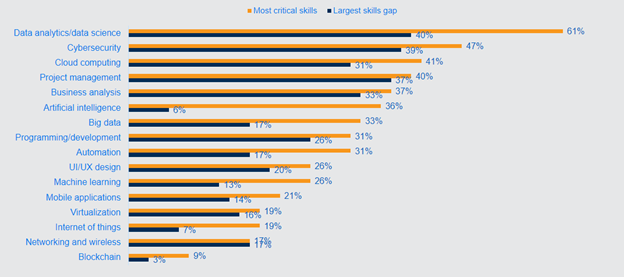Digital Transformation: Demand Outstrips Supply in the War for Talent
Organisations focused on building resilience and flexibility in their business are the most likely to not only survive, but thrive, in times of disruption.
13 October, 2022

Organisations focused on building resilience and flexibility in their business are the most likely to not only survive, but thrive, in times of disruption. These are the organisations who have embraced and are forging ahead with their digital transformation strategies.
However, any transformation project will be obstructed without the skilled talent needed to progress and the project and bring it to completion.
TEKsystems recently conducted an online survey with nearly 600 technology and business decision-makers. Respondents included members of the C-suite, company executives, vice presidents, directors and managers who have final decision-making authority and/or influence on their organisation’s digital transformation efforts. The sample included a balance of decision-makers in enterprise IT and line-of-business functions in Australia, Canada, China, India, the United Kingdom and the United States, across a broad spectrum of industries.
People are the essential element of success
Nine out of 10 organisations reported that they don’t have the talent they need to succeed with digital transformation. The rapid evolution of technologies, business models and ways of working dramatically impact the cornerstone of any company – their people. When companies hit the fast forward button on transformation, weaknesses become abundantly clear.
The most critical skills and the largest skills gap
While the technology industry continues to thrive, organisations are facing a war for talent, with many leading companies in our research reporting that the most critical skills needed to deliver their strategic projects are also where the largest skill gaps exist.
From the research, data analytics and data science, are the most in demand skills, with well over half of respondents (61%) citing them as critical to the successful completion of their strategic initiatives. Despite being highly sought after, 40% of respondents confirmed that this is also where the largest skill gap exists within their teams – posing a threat to delivery and planned timelines of their ongoing projects.
Cybersecurity and cloud computing remains in high demand, with 41% and 47% of customers respectively reporting a need for specialists in this domain. Despite such high market demand for cloud and cybersecurity skills, respondents also reported gaps for these skills from within their current team.
Demand remains high for staple skills such as project management and business analysis, with 40% and 37% of those surveyed reporting these skills as critically needed skills. Supply only marginally outweighs demand, and this could tip at any time.
Our research found the least in demand skills to include mobile applications, virtualisation, IoT, networking and wireless. Blockchain is currently the least in demand skill with only 9% of those surveyed looking to hire blockchain developers for their projects.

Attracting the talent in a candidate led market
Overall, our research showed that the top five most in demand skills needed to complete strategic digital transformation projects were also those where the largest skill gaps exist. With demand outstripping supply across data, cyber security, cloud, project management and business analysis, candidates have the power to choose where they work and which projects they want to work on.
Companies face an urgent need to identify new talent pools, as well as reskill and upskill their existing workforce. The integration of AI, automation and collaboration tools are driving significant change in the types of skills employees need to succeed in their jobs. Overcoming these challenges will require creative talent strategies, so companies can acquire and cultivate the skills they need to build a future-ready workforce.
Opportunity for talent
As organisations continue to move business operations, products and services online, digital transformation remains a strategic priority, and the skills required to continue to be in high demand. Capability to build and maintain the cloud environment, protect it from cyber-attacks, and process the resulting data means that for candidates working in IT, the hottest opportunities in the market data scientists, cloud and cyber security engineers and these skills look set to remain in high demand for some time to come.
Project management and business analysis skills are also critical to support the digital journey, but with a smaller gap between demand and supply, it will be down to candidate to ensure they develop quickly and know how to differentiate to stand out.
The shortfall in necessary tech skills is creating opportunity for skilled individuals. The chasm between demand and supply is reflected in increases in median salary ranges for the most sought skills. Demand for skills is also being experienced outside of traditional economic centres – businesses are basing themselves where the skills exist. Meaning that workers have more freedom of choice when it comes to deciding where to work and live.